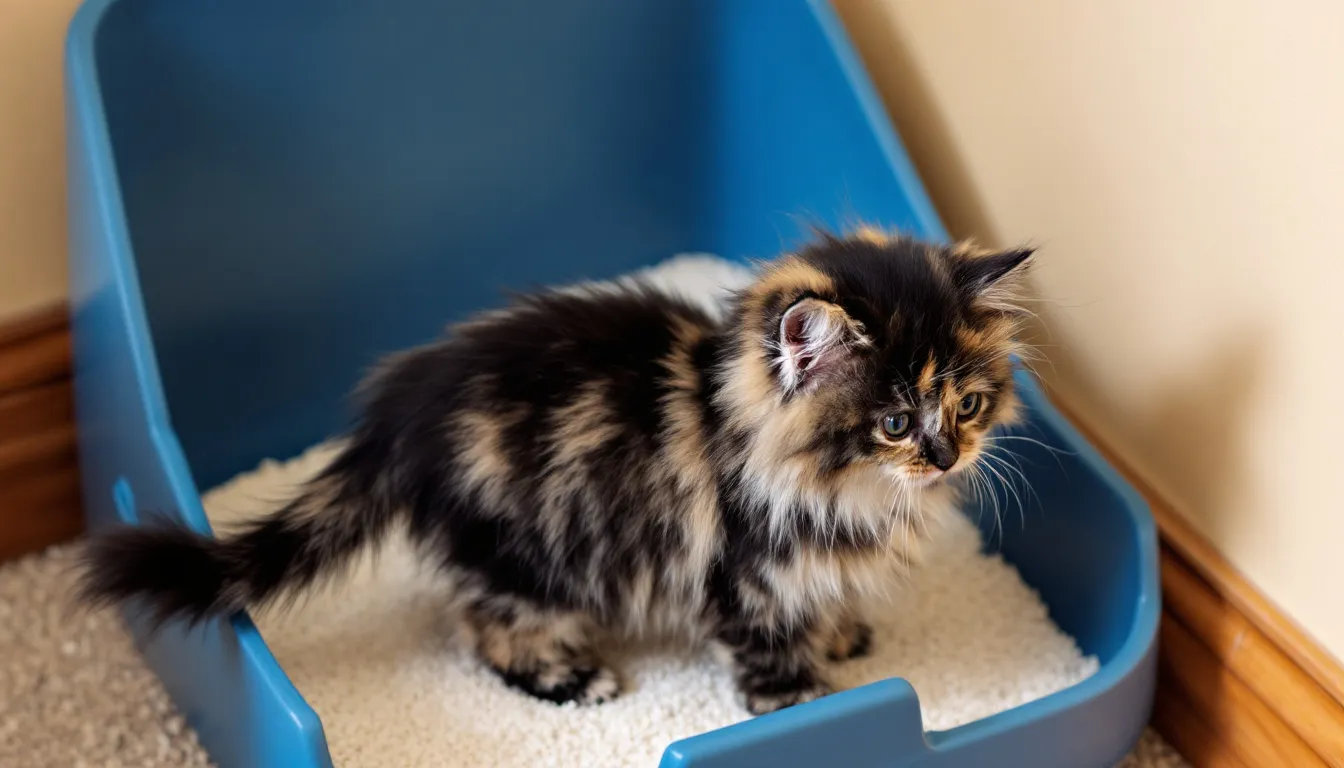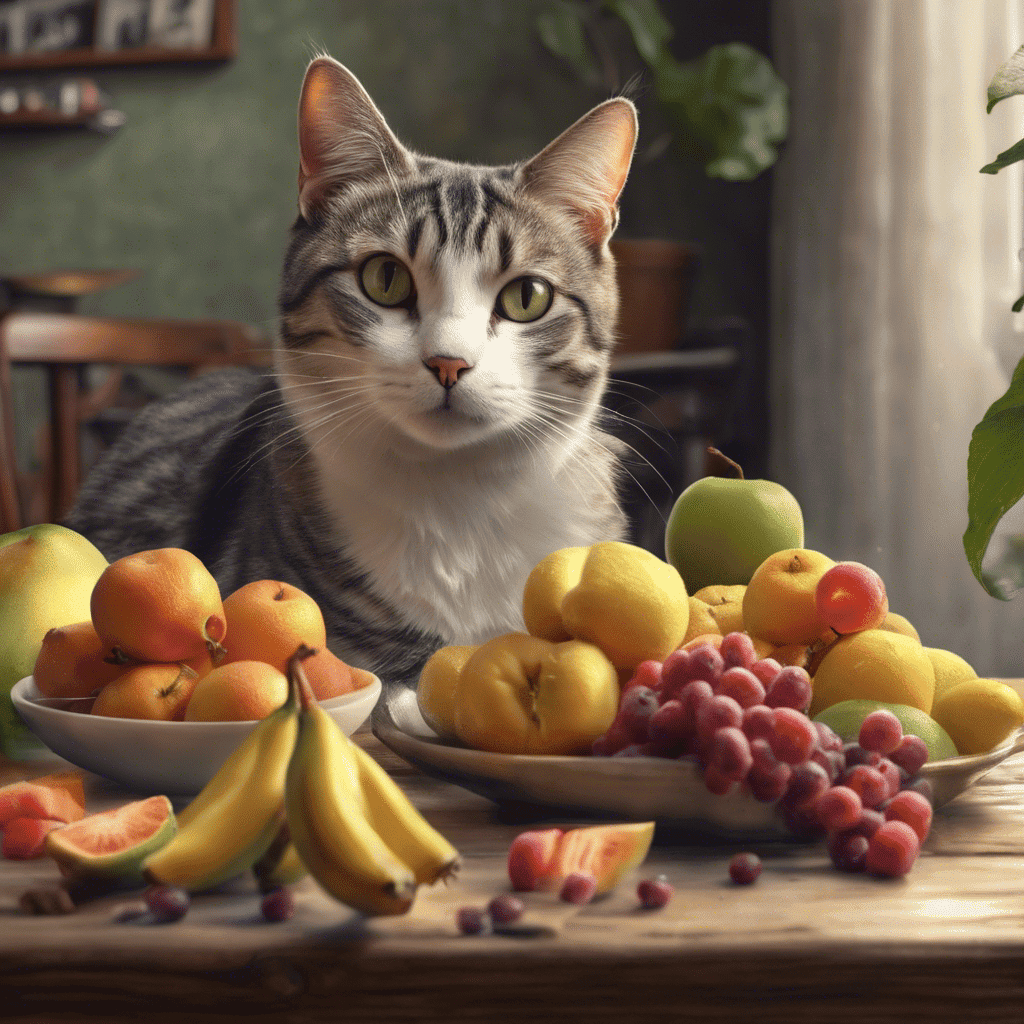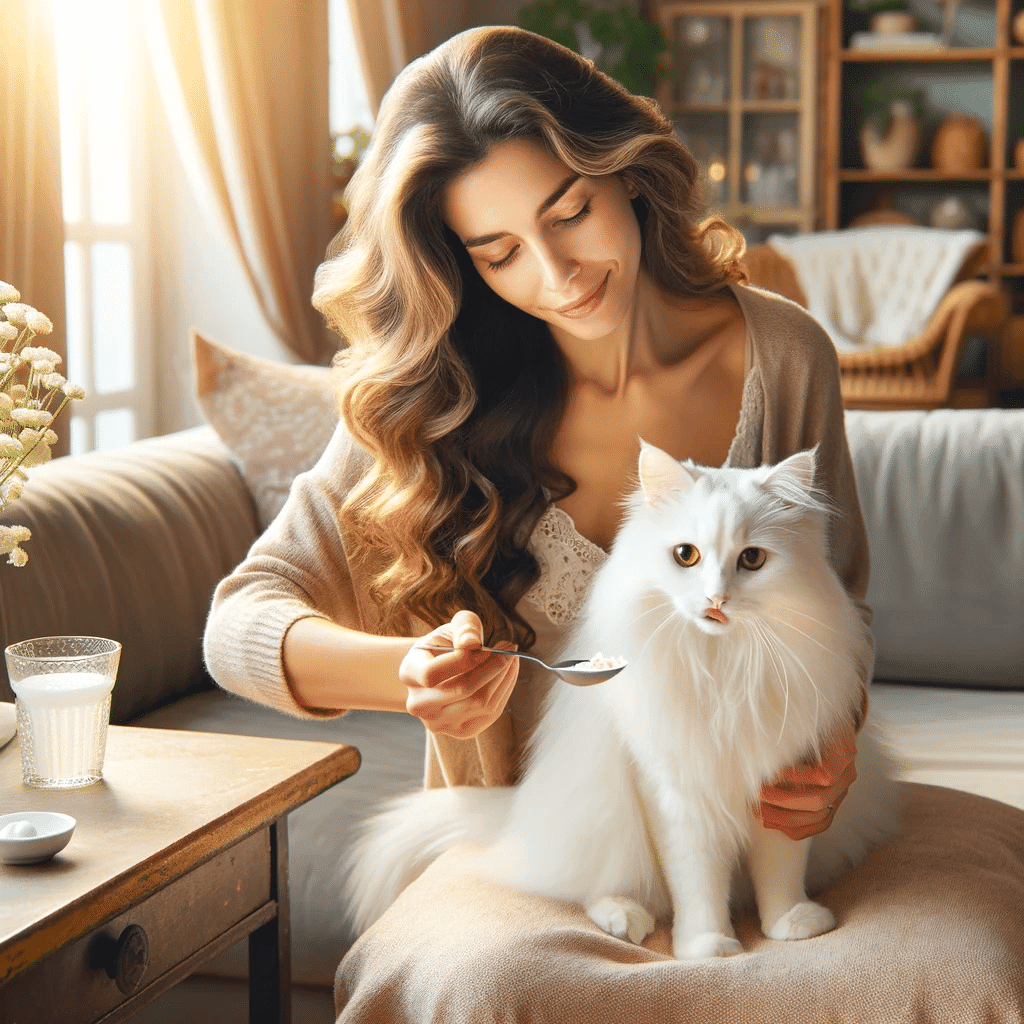
Watching your kitten struggle in the litter box can be truly heartbreaking. Constipation in kittens is more than just a minor issue – it can lead to serious health concerns if not addressed promptly. Dehydration and stress are often the primary culprits behind this uncomfortable condition. So, what’s the best way to help your kitten overcome constipation?
Let’s start with the basics.
Ensuring your kitten stays well-hydrated is important, so make sure they’re drinking enough water. You may also want to consider making some dietary adjustments. Adding fiber-rich foods to their meals can work wonders in getting their digestive system back on track. However, if your kitten’s symptoms persist, it’s essential to seek professional advice as soon as possible. By addressing constipation promptly, you can prevent discomfort and ensure your kitten remains happy and healthy.
After all, a happy kitten is a healthy kitten! Read on to learn how to watch out for symptoms and understand the common causes and steps you can take to relieve your kitten of constipation.
📌 Immediate Steps to Relieve Cat and Kitten Constipation
Cat and kitten constipation is a common issue many pet owners face – and it can be distressing for you and your furry friend. But don’t worry, below are some simple steps to help ease their discomfort.
Ensure Proper Hydration
Hydration helps in preventing constipation. Cats often don’t drink enough water, which can lead to hard stools. Here’s what I recommend:
Offer fresh water regularly
Make sure your kitten always has access to fresh water. I like to change the water at least twice a day. Some kittens prefer running water, so consider investing in a pet water fountain. It can encourage them to drink more.
Consider wet food to increase fluid intake
Switching to wet food can significantly boost your kitten’s fluid intake. Wet food contains about 70-80% moisture, compared to dry food’s 10%. This extra moisture can help soften stools and make bowel movements easier. If your kitten is used to dry food, try mixing a little wet food into their meals gradually.
Dietary Adjustments
Diet plays a key role in managing cat and kitten constipation. A few tweaks can make a big difference.
Introduce fiber-rich foods
Fiber helps move things along in the digestive tract. I suggest adding a small amount of fiber-rich food to your kitten’s diet. Foods like canned pumpkin are excellent choices. Just a teaspoon mixed into their food can help. Remember, too much fiber can have the opposite effect, so start small.
Use pumpkin puree as a natural laxative
Pumpkin puree is a natural remedy that many pet owners swear by. It’s gentle on the stomach and can help regulate bowel movements. Add 2-4 teaspoons of canned pumpkin to your kitten’s food. Make sure it’s plain pumpkin, not the spiced pie filling. This simple addition can work wonders for cat and kitten constipation.
Here’s a quick comparison of dry vs. wet food benefits:
|
Aspect |
Dry Food Benefits |
Wet Food Benefits |
|---|---|---|
|
Moisture Content |
Low (10%) |
High (70-80%) |
|
Hydration |
Less effective |
Helps prevent constipation |
|
Storage |
Easy to store |
Requires refrigeration after opening |
|
Cost |
Generally cheaper |
Can be more expensive |
The above steps should help your kitten feel more comfortable and prevent future episodes of constipation. Continuously monitor their behavior and consult a vet if symptoms persist.
Identifying Symptoms of Constipation in Kittens
Behavioral Signs
Kittens often show changes in behavior when they’re constipated. Here are some things to watch for:
Straining in the litter box
One of the most apparent symptoms of kitten constipation is straining in the litter box. If your kitten spends a lot of time trying to go but nothing happens, that’s a red flag. 🚩 They might even meow or cry out in frustration. This behavior indicates they’re having trouble passing stools.
Reduced appetite and lethargy
A constipated kitten might not feel like eating. You might notice their food bowl isn’t emptying as quickly as usual. Along with a reduced appetite, they could seem more tired or less interested in playing.
Lethargy often accompanies constipation, as your kitten might feel uncomfortable or in pain.
Physical Symptoms
Besides behavioral changes, there are physical symptoms to look out for:
Hard, dry stools
When cleaning the litter box, check the consistency of your kitten’s stools. Hard, dry stools are a common sign of constipation. They might be smaller than usual or look like little pellets. This indicates that your kitten’s digestive system isn’t working smoothly.
Abdominal discomfort
Gently feel your kitten’s belly. If they react by pulling away or seem uncomfortable, they might be experiencing abdominal discomfort. A bloated or firm belly can signal constipation. It’s important to handle them gently and observe their reactions.
If you notice any of these signs, consider trying some home remedies.
However, if symptoms persist, don’t hesitate to seek professional help. Your kitten’s health and comfort are worth it.
Common Causes of Kitten Constipation
Dietary Issues
Having proper diet is beneficial for your kitten’s digestive health. A few tweaks here and there can often prevent or alleviate constipation.
Low fiber intake
Fiber is essential for smooth digestion. Without enough fiber, your kitten’s stools can become hard and difficult to pass. Many commercial cat foods lack sufficient fiber, which can lead to a constipated cat. I recommend checking the labels on your kitten’s food.
Look for options that include fiber-rich ingredients like pumpkin or psyllium husk. These can help keep things moving along in their digestive tract.
Dehydration
Dehydration is another major cause of constipation in kittens. Cats often don’t drink enough water, especially if they’re on a dry food diet. This lack of hydration can lead to hard, dry stools. To combat this, ensure your kitten has constant access to fresh water. You might also consider incorporating wet food into their diet. Wet food contains higher moisture content, which can help prevent a constipated cat.
Environmental Factors
Sometimes, it’s not just about what your kitten eats. Their environment and daily routine can also impact their digestive health.
Stress or changes in routine
Kittens are sensitive creatures. Stress or sudden changes in their environment can lead to constipation. Have you recently moved, introduced a new pet, or changed your kitten’s routine? These factors can cause anxiety, which might affect their bowel movements.
Creating a calm and stable environment can help alleviate stress-related constipation.
Lack of exercise
Just like humans, kittens need regular exercise to maintain healthy digestion. A sedentary lifestyle can slow down their digestive system, leading to constipation. Encourage your kitten to play and move around. Toys, climbing structures, and interactive playtime can stimulate their body and help prevent constipation.
Here’s a quick overview of these common causes:
|
Cause |
Description |
Solution |
|---|---|---|
|
Low fiber intake |
Insufficient fiber in diet |
Add fiber-rich foods like pumpkin |
|
Dehydration |
Not enough water intake |
Provide fresh water and wet food |
|
Stress |
Anxiety from changes in environment or routine |
Maintain a calm and stable environment |
|
Lack of exercise |
Insufficient physical activity |
Encourage play and movement |
Understanding these causes can help you take proactive steps in treating kitten constipation. If you notice persistent issues, consulting a vet is always a wise choice.
Your kitten’s comfort and health are worth the effort!
Home Remedies for Kitten Constipation
Ever felt helpless watching your kitten struggle with constipation? You’re not alone. Many pet owners face this challenge, and knowing how to help kitten constipation can make a world of difference.
Let’s go through some effective home remedies that can bring relief to your furry friend.
Step by Step Detailed Instructions
How to administer pumpkin puree
Pumpkin puree is a gentle and natural remedy that can help alleviate constipation in kittens. Here’s how you can introduce it to their diet:
-
Choose the Right Pumpkin: Make sure you use plain canned pumpkin, not the spiced pie filling. The latter contains additives that aren’t safe for kittens.
-
Start Small: Begin by mixing 1-2 teaspoons of pumpkin puree into your kitten’s regular food. This amount is usually sufficient to help with mild constipation.
-
Monitor Their Reaction: Observe how your kitten responds to the pumpkin. If they tolerate it well, you can gradually increase the amount to 2-4 teaspoons per meal.
-
Consistency is Key: Offer pumpkin puree once or twice a day until you notice an improvement in their bowel movements.
Gentle belly massages
A gentle belly massage can also aid in relieving constipation. Here’s a simple guide:
-
Create a Calm Environment: Ensure your kitten feels relaxed and comfortable. A quiet room with soft lighting works best.
-
Use Gentle Pressure: With clean hands, gently rub your kitten’s belly in a circular motion. Start from the ribcage and move down towards the tail.
-
Observe Their Comfort Level: Pay attention to your kitten’s reactions. If they seem uncomfortable, stop immediately.
-
Repeat Daily: Perform this massage once a day to help stimulate their digestive system.
What You Need
List of safe foods and tools
To effectively manage constipation, you’ll need a few essentials:
-
Pumpkin Puree: As mentioned, this is a safe and effective remedy.
-
Fiber Supplements: Products like Metamucil or Vetasyl can be sprinkled over food to increase fiber intake.
-
Wet Food: Incorporating wet food into your kitten’s diet can boost hydration and ease constipation.
-
Pet Water Fountain: Encourages your kitten to drink more water, which prevents constipation.
Access to fresh water
Hydration is vital for a healthy digestive system. Ensure your kitten always has access to fresh water. Consider these tips:
-
Change Water Regularly: Refresh their water bowl at least twice a day to keep it clean and appealing.
-
Use a Fountain: Some kittens prefer running water. A pet water fountain can encourage them to drink more.
When to Seek Veterinary Help
Recognizing when to seek veterinary help is crucial for your kitten’s health.
Severe or Persistent Symptoms
When should you worry? If your kitten shows no improvement after trying home remedies, it’s time to consider professional help. Constipation can sometimes mask more serious issues.
No improvement after home remedies
You’ve tried everything—hydration, dietary changes, even pumpkin puree—but your kitten remains constipated. This lack of progress signals that the problem might be more complex. A veterinarian can assess the situation and provide a more targeted treatment plan.
Signs of pain or distress
Watch for signs of pain or distress. If your kitten cries out when trying to pass feces or seems unusually lethargic, these are red flags. Painful bowel movements or a bloated abdomen indicate that your kitten needs immediate veterinary attention.
Veterinary Treatments
Once at the vet, several treatments can help alleviate your kitten’s discomfort. Vets have a range of options to address constipation effectively.
Possible medications
Veterinarians might prescribe medications like lactulose to soften the feces and make it easier for your kitten to pass them. These medications work by drawing water into the intestines, helping to lubricate the digestive tract.
Diagnostic tests
To understand the root cause, your vet may recommend diagnostic tests. These tests can include X-rays or ultrasounds to check for blockages or other underlying issues.
Identifying the cause is essential for effective treatment. Understanding when to seek veterinary help can make all the difference for your kitten. If home remedies don’t work or if your kitten shows signs of distress, don’t hesitate to consult a vet. Their expertise can provide the relief your kitten desperately needs.
Prevention Tips for Future Constipation in Cats
Ever felt the frustration of seeing your kitten struggle with constipation? I know how it feels. Preventing constipation in kittens is not just about immediate relief but ensuring long-term health.
Balanced Diet
A balanced diet plays a crucial role in preventing constipation in kittens. I’ve seen firsthand how dietary adjustments can make a world of difference.
Importance of fiber and hydration
Fiber and hydration are key to a smooth digestive process. Adding fiber to your kitten’s diet can help with constipation. You might consider mixing canned pumpkin into their food or switching to a high-fiber cat food.
Fiber helps move things along in the digestive tract, making it easier for your kitten to pass stools.
Hydration is equally important. Dehydration often leads to hard stools, which can cause discomfort. Ensure your kitten has constant access to fresh water. A pet water fountain can encourage them to drink more, reducing the risk of dehydration.
Regular feeding schedule
Maintaining a regular feeding schedule helps regulate your kitten’s digestive system. Feed them at the same times each day. This routine helps their body anticipate meals, promoting regular bowel movements. Discuss your kitten’s diet with your vet to ensure it meets their nutritional needs.
Many commercial cat foods provide adequate fiber, but it’s always good to double-check.
Here’s a quick comparison of dietary elements:
|
Element |
Importance |
Tips for Implementation |
|---|---|---|
|
Fiber |
Aids digestion and prevents constipation |
Add canned pumpkin or high-fiber food |
|
Hydration |
Prevents dehydration and hard stools |
Provide fresh water and use a fountain |
|
Regular Feeding |
Regulates digestive system |
Feed at consistent times daily |
Regular Exercise
Exercise is another vital component in preventing constipation in cats. It keeps their digestive system active and healthy.
Encouraging playtime
Encouraging playtime is essential. Kittens are naturally playful, and regular activity helps stimulate their digestive tract. Spend time each day engaging your kitten in play.
Use toys that encourage movement, like feather wands or laser pointers. This activity not only prevents constipation but also strengthens your bond with your kitten.
Providing stimulating toys
Providing stimulating toys keeps your kitten active even when you’re not around. Toys that mimic prey, like mice or balls, can keep them entertained and moving. Consider investing in a cat tree or climbing structure. These encourage climbing and jumping, promoting physical activity.
Here’s a look at some exercise options:
|
Activity |
Benefits |
Examples |
|---|---|---|
|
Playtime |
Stimulates digestion and prevents constipation |
Feather wands, laser pointers |
|
Stimulating Toys |
Keeps kitten active and engaged |
Cat Toy mice, balls, climbing structures |
Preventing constipation in kittens involves a combination of diet and exercise. Focusing on these areas can help your kitten lead a healthy and comfortable life.
Remember, if you notice persistent issues, consulting a vet is always a wise choice. Your kitten’s well-being is worth every effort!
Pro Tips and Common Mistakes to Avoid
Ever felt like you’re doing everything right, yet your kitten still struggles with constipation? You’re not alone. Many cat owners face this challenge. Over the years, I’ve learned a few pro tips that can make a big difference.
Pro Tips
Gradual dietary changes
When it comes to diet, sudden changes can upset your kitten’s stomach. I recommend introducing new foods slowly. Start by mixing a small amount of the new food with their current diet. Gradually increase the proportion over a week. This approach helps your kitten adjust without causing stress or digestive issues. Remember, patience is key.
A gradual transition can prevent constipation and keep your kitten happy.
Monitoring litter box habits
Keeping an eye on your kitten’s litter box habits is crucial. Regular monitoring helps you spot any changes early. Check for signs like straining or hard stools. These can indicate constipation.
If you notice anything unusual, take action promptly. Adjust their diet or hydration as needed. Consistent monitoring ensures you catch issues before they become serious.
Common Mistakes
Over-reliance on home remedies
Home remedies can be helpful, but relying on them too much can be risky. If your kitten’s constipation persists, it’s essential to consult a vet. Home remedies might not address underlying health issues. A professional can provide a proper diagnosis and treatment plan.
Don’t hesitate to seek veterinary advice if needed. Your kitten’s health is worth it.
Delaying veterinary consultation
Delaying a vet visit can lead to complications. If your kitten shows severe symptoms like pain or distress, don’t wait. Immediate veterinary care can prevent further health problems. A vet can perform diagnostic tests to identify the cause of constipation. Early intervention is crucial for your kitten’s well-being.
Understanding these pro tips and common mistakes can make a significant difference in managing your kitten’s constipation. By taking proactive steps and avoiding pitfalls, you can ensure your cat stays healthy and comfortable.
Always prioritize your kitten’s well-being and consult a vet when necessary.

In her previous life, Lisa traveled extensively, both for work and leisure. After the pandemic struck, Lisa locked up her luggage and adopted a cat ever since.
Lisa is now an avid cat lover, she devotes most of her free time serving as butler to her adorable feline at home. When she is not with her cat, she can be seen using her phone sourcing for the latest cat supplies online.


